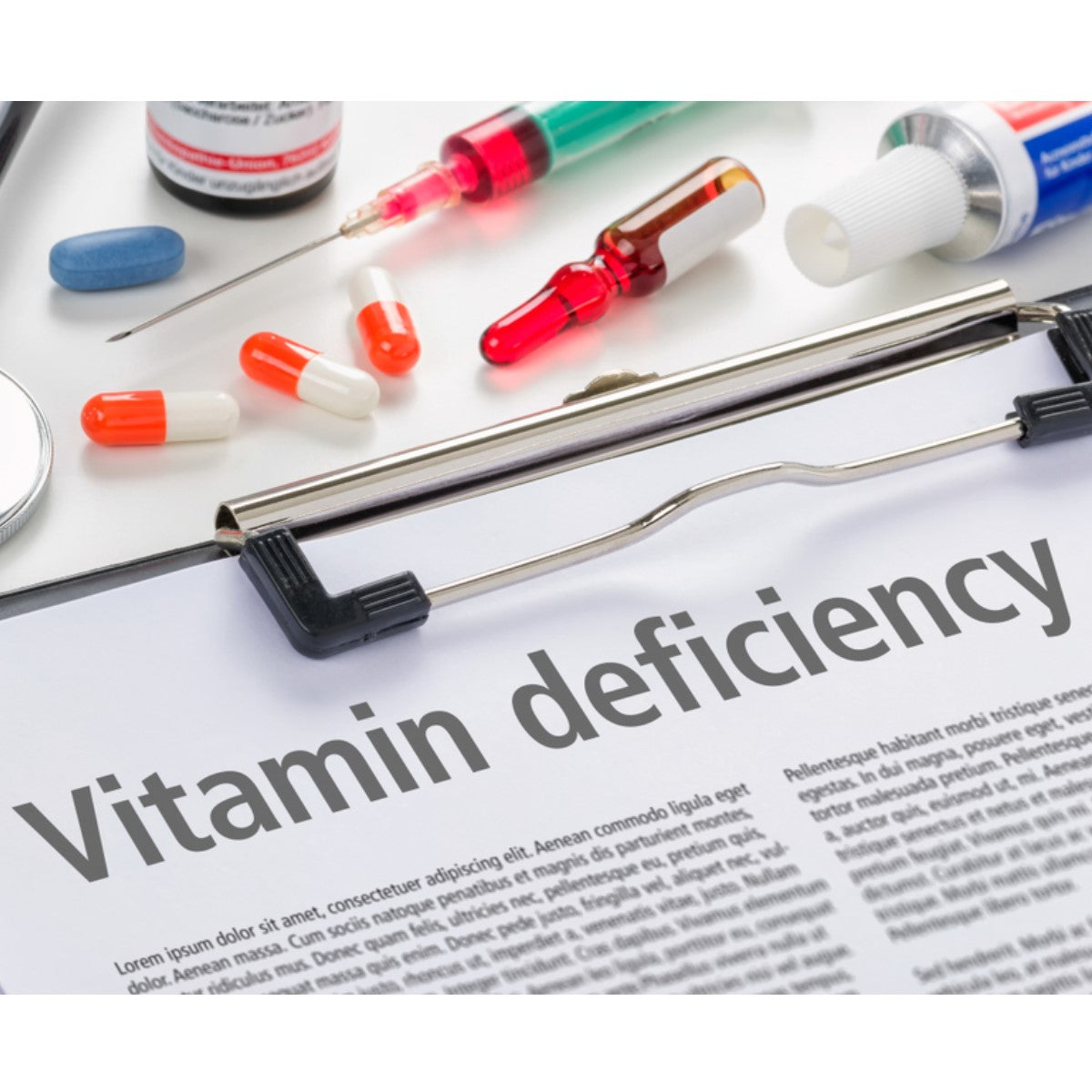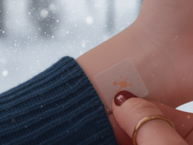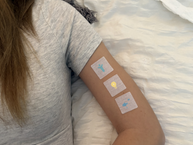We hear all the time about the US being over nourished - think: obesity! - but what about nutrient deficiencies? It turns out that they’re pretty common! In fact, about 1 in 10 Americans overall have a deficiency of at least one nutrient, and certain groups have a greater prevalence of deficiencies.
So, do you have a deficiency? Which vitamins might you be low in? And how can you prevent them? Here are the most common vitamin deficiencies in the US, as well as how to find out if you might have them and what you can do to avoid or address them. You and your healthcare provider can decide which Vitamin Patches by PatchAid may be right for you to support nutritional status.*
Vitamin D
Overall, about 8% of the US population is deficient in Vitamin D. That number is lower for white Americans, higher for Hispanic Americans, and over 30% for Black Americans.
Vitamin D is known as the sunshine vitamin because your body can make it when you’re in the sunshine. Radiation from the sun can trigger your skin to convert vitamin D to a more active form.
Vitamin D is also in a few foods, though not many. It’s in fortified milk, many dairy substitutes such as almond and soy milk, and many fortified foods such as vitamin D-fortified orange juice and breakfast cereals. It’s also in fatty fish and egg yolks.
Along with certain racial or ethnic groups, some other people are at higher risk for a vitamin D deficiency. They include the following.
- People who always use sunscreen when out in the sun.
- People who tend to cover their skin well in the sun, so there is little direct exposure to the sun.
- Bariatric surgery patients.
- Overweight and obese adults.
- People who live in northern climates.
- Older adults.
Vitamin D3 Patches by PatchAid can help you get more vitamin D3, which is the active form of the vitamin.* Both the Vitamin D3/Calcium and Vitamin D3 with K2 Patches by PatchAid contain 5300 IU of vitamin D. It’s a way to get your vitamin D without getting any sun exposure!
These patches may:*
- Support strong bones.
- Support breast, heart, and brain health.
- Promote normal blood sugar and glucose metabolism.
- Support normal immune function.
It’s easy to check for a vitamin D deficiency. Your doctor can order a blood test. You don’t have to be fasting, and any standard medical lab should be able to do this test.
B Vitamins
There are a lot of B vitamins, and they’re all important. B vitamins are necessary for normal energy metabolism. Some B vitamins are needed for healthy red blood cell formation and for heart health. You need certain B vitamins for brain health and a proper mood. Growing embryos need B vitamins for neural tube development and the prevention of birth defects.
B vitamins are a diverse group of nutrients, and they’re in a lot of foods. These are some examples.
- Vegetables, especially green vegetables.
- Potatoes.
- Fish and seafood.
- Meat and poultry.
- Milk and other dairy products.
- Beans, split peas, and lentils.
- Fortified cereal and fortified flour and other grain products.
- Nuts and seeds.
Certain groups are at higher risk for B vitamin deficiencies or may need higher amounts of them. These are some examples.
- Older adults.
- Bariatric surgery patients.
- Women who are pregnant or breastfeeding, or who may become pregnant.
- People who misuse alcohol.
- People who eat a plant-based or vegan diet.
The B12 Energy Plus Vitamin Patch by PatchAid contains all of the B vitamins.
- Thiamin (B1)
- Riboflavin (B2)
- Niacin (B3)
- Pantothenic acid (B5)
- B6 (pyridoxine)
- Biotin
- Folic acid
- B12
It also has choline, ginseng, and rhodiola rosea, which can affect energy and focus.*
These patches may:*
- Support healthy energy and metabolism.
- Promote normal brain function and mood.
- Support heart and blood health.
- Support breast and colon health.
Ask your doctor if you have concerns about a B vitamin deficiency or you have risk factors for one. There are different tests that can be done to narrow in on which B vitamin(s) may be deficient.
Iron
Iron deficiency is the most common mineral deficiency in the world. It’s common in the US, too. About 1 in 10 individuals may have it. You’re at higher risk for iron deficiency if you’re in one of these groups.
- Women of child-bearing age.
- Pregnant or breastfeeding.
- Children and adolescents.
- Serious athletes and very active people.
- Colitis or irritable bowel disease (IBD).
- Bariatric surgery patients.
- Vegan (strict plant-based) diet.
Iron is in a variety of foods, especially these.
- Meat and poultry.
- Fish and seafood.
- Egg yolks and dairy products.
- Green vegetables.
- Potatoes.
- Raisins.
- Beans and lentils.
- Fortified grains, such as flour, breakfast cereal, and refined grain products.
Animal-based products have a form of iron known as heme iron. It’s more absorbable than non-heme iron. Plant-based products only contain non-heme iron.
The Iron Plus Vitamin Patch by PatchAid has 50 mg of elemental iron from organic curry extract. It also has vitamin C, which helps with absorption, and vitamins A and B9 (folic acid). Getting your iron from a patch instead of from oral supplements can help avoid common side effects such as constipation.
The Iron Plus Vitamin Patch may:*
- Protect cells against oxidative damage.
- Support healthy red blood cell formation.
- Promote normal immune function.
If your doctor recommends it, you can opt instead for the Simply Iron Vitamin Patch by PatchAid. All it has is iron.
Blood tests can help your healthcare provider determine if you have an iron deficiency. You might also notice signs of iron-deficiency anemia, such as being tired or getting frequent infections. Other signs can include spoon-shaped or brittle nails and feeling cold sometimes.
Daily Multivitamin Patch
What about the other essential vitamins and minerals? Might you be at risk for deficiencies of any of them, even if they’re not common? And what if you don’t have any specific concerns, but you want to be sure you’re providing your body with the nutrition it needs?
You don’t have to have a deficiency or any specific concerns to consider taking a daily multivitamin supplement. A daily multivitamin can contain a wide range of essential vitamins and minerals. Why might that be important?
Well, foods can definitely provide all of the essential vitamins and minerals, but they don’t always meet your needs every day. There can be a few reasons for that.
- Your needs may be higher than normal.
- You may not have a varied enough diet to get the daily recommended amount of every single essential nutrient every single day.
- You may be eating a restricted diet that doesn’t contain enough of certain vitamins and minerals to meet your needs.
A multivitamin and mineral supplement can give you nutrients that you never really thought about. For example, what about iodine? It turns out, according to the CDC, that some groups of Americans are commonly borderline deficient in iodine. These include young women.
What’s special about iodine? It’s abundant in seafood, since iodine is abundant in the ocean. Beyond that, however, the amount that is naturally found in foods depends on the amount in soil. And, many regions have soil that’s low in iodine.
Table salt is now commonly iodized in the US, but not everyone uses iodized table salt. There are a few reasons for this. One is that non-iodized table salt is readily available in the US as well. Another reason is that salt used in processed foods is not required to be fortified with iodine. That means you can eat a high-salt diet, with foods such as pickles, cheese, olives, bread, and fast food, without getting much iodine.
The Multivitamin Plus Patch by PatchAid includes iodine. It also has another 26 essential vitamins and minerals that, for a variety of possible reasons, you may not be getting in sufficient quantities every day from the foods you eat. It’s an easy way to take your vitamins. Just ask your healthcare provider if it may be right for you. And remember - it’s okay to use multiple vitamin patches at once, so using the Multivitamin Plus Patch by PatchAid doesn’t mean you can’t use other patches as well.
Vitamin and mineral deficiencies in the US may be surprisingly common, but you can take steps to prevent them. A healthy diet and vitamin patches that your healthcare provider recommends can help you prevent vitamin and mineral deficiencies.* See what PatchAid Patches may be right for you!
*The Food and Drug Administration has not evaluated these statements. PatchAid patches are not intended to diagnose, treat, cure or prevent any disease. Anyone with a medical condition should seek the advice of a licensed medical practitioner. Individual results may vary.







